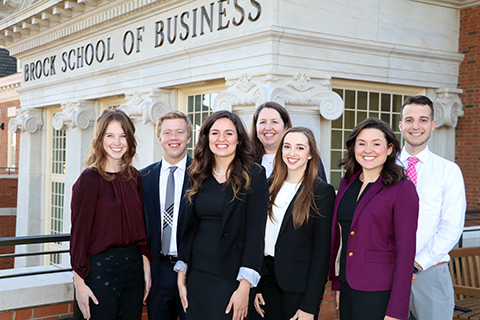Nonbusiness Majors
Any Samford major can add a social entrepreneurship minor to his or her nonbusiness major.
Redemptive Entrepreneurship
Samford's social entrepreneurship and nonprofit management program seeks to develop the next generation of business leaders who desire to pursue redemptive entrepreneurship across the globe. Grounded in the irrepressible hope of Jesus Christ, we value restoration of culture through sacrifice, other-centeredness, and love. Students will take classes in the core business disciplines of economics, finance, accounting, management and marketing while matching a student's goal of pursuing opportunities in the business and nonprofit world dedicated to helping solving society's social problems.
"Redemption" is an economic term that means to buy back something (or someone) to restore it to its rightful place. For Christians it is full of great theological meaning, referring to Jesus’ act of becoming human and sacrificing his life so that we could be restored to a right relationship with God and his creation.Praxis Labs
We utilize a variety of methods to achieve our goal of developing “redemptive-minded” business leaders.
-
- Students annually participate in the Lion’s Den event, a pitch competition similar to “Shark Tank” where a Kingdom-focused panel funds new endeavors focused on the “quadruple bottom-line”.
- Students participate in the Praxis Academy (a communal learning experience for putting faith into action through work).
- Students are required to develop a business plan for a new social entrepreneurship venture as their capstone experience. Over 60 projects have been completed over the last decade and many of these new ventures are fully functioning including:
- Women’s Bakery - assist women in East Africa obtain gainful employment and sell nutritious, affordable breads through profitable bakeries.
- Amplio Recruiting - a job training/placement for-profit that works with international refugees in Atlanta to help them find long-term employment.
- Karisimbi Partners - investment bank/management consulting firm in Kigali, Rwanda to help Rwandan entrepreneurs access US capital markets.
- Five Loaves – an innovative approach to racial reconciliation in Birmingham.
Innovative Curriculum
The companies and organizations that engage in social entrepreneurship range from Fortune 500 companies to nonprofit organizations. In today's world, multinational companies such as Google, Coca-Cola, 3M Company, Cisco and Target embed their commitment to social causes within their core corporate mission. Their commitment to social causes helps them tackle many social issues such as dealing with the environment, improving education, development of communities and researching clean energy alternatives. Our innovative curriculum teaches Brock School of Business students the skills necessary to help solve the social problems businesses face or are committed to in the world today.
Unique Educational Experience
Our social entrepreneurship and nonprofit management program is one of 30 programs worldwide and unique in the state of Alabama. The social entrepreneurship concentration is uniquely designed to match the core mission of the moral foundation at Samford with a student's desire to help their community. Our distinguished faculty offers students an unique educational experience.
Passion for Solving Problems
Each day, nonprofits, businesses and government agencies face daunting and complex social problems. These social problems deserve to be solved by passionate, sophisticated and technically competent entrepreneurs who are willing to think creatively and who operate efficiently and effectively to find a solution. Graduates of the program have the critical problem solving skills and passion businesses need to be successful in today's global marketplace.
Meet the Program Coordinator
The social entrepreneurship and nonprofit management program at Samford is run by Professor Jeremy Thornton. He teaches developmental economics, social entrepreneurship, international economics, and micro-economic theory. Prior to his academic career, Thornton was involved in international economic development. In that role, he facilitated the design micro-finance and anti-poverty programs for civil society organizations in developing countries, primarily Latin America. His projects ranged from micro-lending programs for refugees to medium-sized agricultural and manufacturing operations.
Read more about the social entrepreneurship projects Professor Thornton’s students have completed and his research.
If you need further information about this minor, please contact associate dean and program coordinator Jeremy Thornton.



